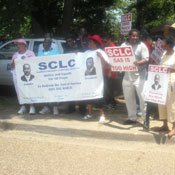As the sun beams above her, Wilma Irving, a resident of Kenner, La., fans herself and begins to tell me the purpose of her journey to Jackson. "I have lit a torch and want young people to become torch bearers and be determined and dedicated in wanting a better future," she says.
Irving traveled about 170 miles to join the nearly 1,000 people marching on the Mississippi Capitol last Saturday in an effort to bring attention to the poor and impoverished of the nation. Like many other marchers, she is a long-time member of the Southern Christian Leadership Conference, which organized the march.
Led by the Reverend Martin Luther King Jr. during the height of the Civil Rights Movement, the SCLC still has one major objective: to use non-violent protests to appeal to the moral conscience of Americans. In the organization's 52 years, the SCLC has focused its mission on conquering discrimination, police brutality and hate, but like his predecessor, the newly appointed interim president Byron Clay has chosen to tackle the issue of poverty.
"We hope to have a national council on poverty established beginning with the (legislative) hearings (on the Delta) in August at the Mississippi State Capitol," Clay said at the June 20 march. Clay, who joined the SCLC at age 14, also hopes to inspire more young people.
Tentatively titled "The Poor Peoples Campaign," the poverty effort will focus on the plight of the Mississippi Delta. With an average household income of about $20,000, one-third of residents in Humphreys County alone receive food stamps. In Clarksdale, the average household income in 2004 was $24,665.
Many impoverished residents attribute the region's economic status to the cyclic effect of a high crime rate and the alarming spread of sexually transmitted diseases. With an economic plan that continues to focus on large corporations and suburban home foreclosures, many Delta residents wonder if the government will address their need for adequate housing, education and financial opportunities.
In organizing the campaign, the SCLC hopes to show Americans that poverty is not an issue of race but of class. "Poverty and being poor brings about shame and stigma, and in today's economy it goes beyond educational levels, because a person's finances could change overnight," said SCLC spokeswoman Renee Richardson.
As police sirens wail and bullhorns start, police begin to lead marchers through the streets. Amelia Robinson, 97, is one of them. "I'm the oldest member," she said. "I remember when Rosa Parks was arrested, all the ministers were called together to try and come up with a solution, and Martin (Luther King Jr.) stayed at the house with me and my husband while he was in town, and that's how the organization came to be."
As she gets into her wheelchair to participate in the march, Robinson sums up the campaign, saying: "I wanted people to realize they were not slaves. I pitied people who were scared. That's why I'm so happy to see the people here today, especially the young people. It's important to stand up for what you believe in.
Previous Comments
- ID
- 149159
- Comment
The best way to protest poverty is to stay in school, gain an education and work for the things you want in life. I don't think a protest is necessary to bring these issues to light.
- Author
- tthornton
- Date
- 2009-06-30T10:14:45-06:00


